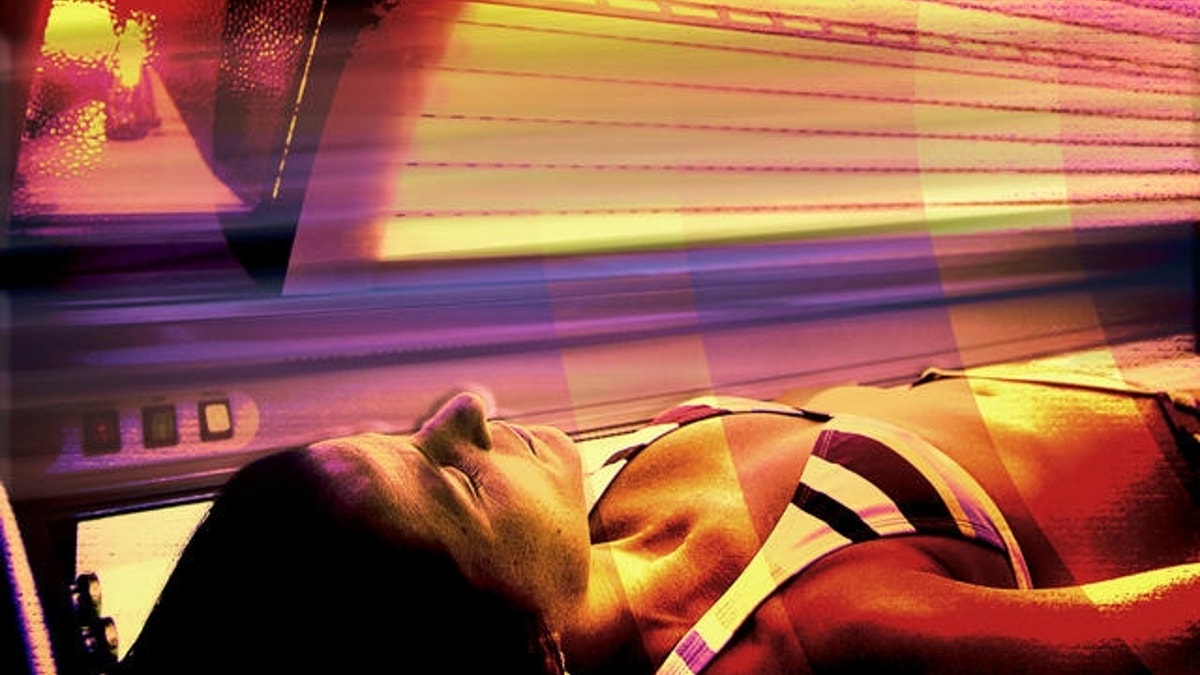
Glenda Fuster lies in a tanning booth with full spectrum lighting at the head at Run to the Sun tanning salon in Anchorage, Alaska, Wednesday, Dec. 14, 2005, to help her cope with the dark winter days. While some Alaskans defy winter by embracing it, others cope by exposing themselves to bright-light therapy, billed by doctors as highly effective. Others install full-spectrum lighting in their homes and offices. Some people frequent tanning booths. Some take antidepressant medications. Some self-medicate with drugs or alcohol. (AP Photo/Al Grillo) (AP)
Women who use tanning salons have a somewhat increased risk of skin cancer, according to a study that adds to evidence that baking in a tan bed can be as bad as baking under the sun.
The study, by a team at Harvard Medical School, looked at data from nearly 730,000 nurses followed for 20 years and found that women who used tanning beds in their youth were more likely than others to develop skin cancer -- basal cell carcinoma in particular.
Though many studies have linked tanning beds to a higher skin cancer risk, the link to basal cell carcinoma, by far the most common form of skin cancer, have been inconsistent.
"We ... investigated whether frequency of tanning bed use during high school/college and at ages 25 to 36 years were associated with a risk of basal cell carcinoma, squamous cell carcinoma and melanoma," wrote Jiali Han and colleagues in the Journal of Clinical Oncology.
"Our data provide evidence for a dose-response relationship between tanning bed use and the risk of skin cancers, especially basal cell carcinoma, and the association is stronger for patients with a younger age at exposure."
Women who used tanning beds at least four times per year between high school and age 35 were 15 percent more likely to develop basal cell carcinoma than non-users.
There were similar risks tied to melanoma and squamous cell carcinoma, a skin cancer that, like basal cell, has a high cure rate. But with melanoma the finding was not statistically significant, which means it could be due to chance.
Of the 730,000 women, just 349 were diagnosed with melanoma, the deadliest form of skin cancer, during the study. That compared with 5,500 diagnosed with basal cell carcinoma.
"This is a very large, well-done study that supports prior findings that indoor tanning is associated with developing melanoma and squamous cell carcinoma," said June Robinson, a research professor of dermatology at Northwestern University in Chicago, who was not involved in the study.
An important finding was that the risk seemed to climb with just a few trips to the tanning salon each year.
"Many (people) tan 20 or more times per year," she noted.
The findings also suggested that there may be a greater risk the earlier a person starts tanning.
Women who had used tanning beds at least seven times a year during high school and college were 73 percent more likely than non-users to eventually be diagnosed with basal cell carcinoma.
The findings, Han's team wrote, support the idea of warning the public against future use of tanning beds and boost the argument for restrictions on salons.
A number of countries have banned minors from using tanning beds, the researchers noted. Last year, California became the first U.S. state to ban anyone under 18-years-old from using indoor tanning devices.